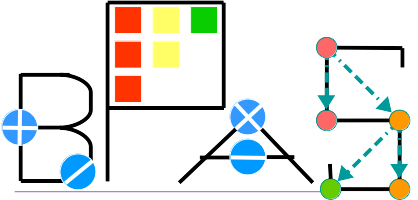Sources Code
Additional Sources
Installation Guide
Requirements
- Linux systems, i.e. Ubuntu
-
GCC version 6+ to compile
CilkPlus programs
as well as C++11 features.
-
CMake version 3.1+
-
GMP library version 5.1.* or later with C++ support
-
Python 2
-
MPSolve version 3.1.4
Building
Instructions can be found in the top-level README. In brief, unpack the tar file and perform the following:
mkdir build && cd build
ccmake ..
make
make check
make sanity-tests ## sanity tests
make validate-tests ## testing against maple
make test ## both sanity-tests and validate-tests
make install ## optional; will copy library and headers to /usr
Building a BPAS application with g++ compiler
-
compiling:
| Flags | Note | |
| -fcilkplus | CilkPlus flag | required |
| -DLINUXINTEL64=1 | Modpn 64-bit mode | required |
| | |
-
linking:
| Flags | Note | |
| -lgmpxx -lgmp | GMP library | required |
| -lcilkrts | CilkPlus library | required |
| -lmodpnLINUXINTEL64 | Modpn library | required |
| -lmps -lpthread | MPSolve | required |
| -lbpas | BPAS library | required |
Real root isolation examples: examples.zip
We provide some examples, that is, the input files in "examples.zip", for univariate and multivariate real root isolation.
To run those examples:
- Put the "examples" folder under the same directory as "BPAS" folder
- cd BPAS/tests/RealRootIsolation
- make univariate (executing univariate cases) or make multivariate (executing multivariate cases)
A Simple Example
In main.cpp:
#include <bpas.h>
int main(int argc, char *argv[]) {
int d = 4095;
DUZP a(d+1), b(d+1);
// Assigning random coefficients to a and b
gmp_randclass r (gmp_randinit_default);
r.seed(time(NULL));
for (int i = 0; i <= d; ++i) {
a.setCoefficient(i, r.get_z_bits(d));
b.setCoefficient(i, r.get_z_bits(d));
}
/* Univariate Integer Polynomial Multiplication */
DUZP c = a * b;
/* Univeriate Real Root Isolation */
DUQP p;
p.setVariableName('x');
p = ((p + mpq_class(1)) << 2) - mpq_class(2); // p := x^2-2
mpq_class width(1, 100);
Intervals boxes = p.realRootIsolate(width);
std::cout << "boxes -> " << boxes << std::endl;
/* Conversion Between Polynomial Classes */
SMQP q("(x+1)*y^4-2*x*y^2+3*x^2+1");
SparseUnivariatePolynomial<SMQP> s = q.convertToSUP('x');
SMQP z (s);
if (z != q) {
std::cout << z << " and " << q << " should not differ " << std::endl;
}
/* Symbolic Integration */
Symbol x_sym('x');
SparseUnivariatePolynomial<RationalNumber> x(x_sym); // identity
SparseUnivariatePolynomial<RationalNumber> f, g;
f.one(); f.setVariableName(x_sym);
g = RationalNumber(1) + RationalNumber(2)*x + (RationalNumber(2)*x)^2;
g ^= 4;
UnivariateRationalFunction<SparseUnivariatePolynomial<RationalNumber>, RationalNumber> h (f, g);
h.realSymbolicNumericIntegrate(53);
return 0;
}
Its Makefile:
CILKPP = g++
LIBARG = -lbpas -lgmpxx -lgmp -lcilkrts -lmodpnLINUXINTEL64 -lmps -lpthread
COMPILEARG = -c -O2 -g -fcilkplus -DLINUXINTEL64=1
TARGET = main
all: $(TARGET)
$(TARGET): $(TARGET).o
$(CILKPP) -o $@ $^ $(LIBARG)
$(TARGET).o: $(TARGET).cpp
$(CILKPP) $(COMPILEARG) $<
ORCCA Lab,
Department of Computer Science,
The University of Western Ontario,
London, Ontario, Canada N6A 5B7

